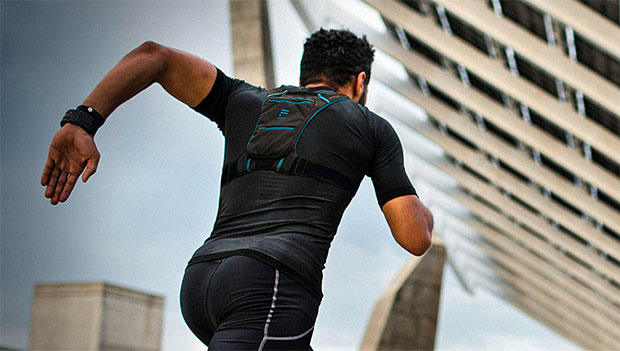
How to Train for a Half Marathon | Running Tips for Your First Half Marathon | Best Half Marathons | Long-Distance Running Shoes | Running Socks | Running Water Bottles | Running Backpacks | Running Belts | Wireless Earbuds for Running | Garmin Fitness Watches
If you want to take your running to the next level, a running backpack may be exactly what you need. There is a wide variety of running backpacks out there, each designed with specific features to meet different fitness goals. Some are made to store small valuables like your sunglasses, wallet, and gels while you take a jog around the block, while others are made to accompany you on distance runs that require you to bring extra fuel for pre- and post-run nutrition or large quantities of hydration. The possibilities are almost endless, so where do you start?
The ACTIVE Reviews Team has compiled a list of the best running backpacks in ten categories. To arrive at our picks, we examined the features common to each bag in their class and the special features that set each company apart. It is also important to note that each individual will have specific needs based on their goals. Because of this, we understand that it is possible none of the running backpacks on our list are best for you. However, we wanted to provide you with a resource for what to look for as you find the running backpack that will help you meet your goals.
Why Trust Us?
ACTIVE.com's editorial team relies on the knowledge and experience of fitness and wellness experts including competitive athletes, coaches, physical therapists, nutritionists, and certified trainers. This helps us ensure the products we feature are of the highest standard. Collectively, the team has spent countless hours researching equipment, gear, and recovery tools in order to create the most accurate, authentic content for our readers. Customer satisfaction is also a key part of our review process, which is why we only feature products that are highly rated. More importantly, each member of our team is a fitness enthusiast. Fitness may be our job, but it is also our passion. Therefore, we strive to bring you products that we trust and would personally use.
The Best Backpacks for Running - Our Top Picks
By clicking on the product links in this article, we may receive a commission fee at no cost to you, the reader.
- Best Overall Running Backpack: Osprey Duro 6 with 1.5L Reservoir
- Best Trail Running Backpack: Camelbak Octane Dart 50 oz.
- Best Running Backpack for Distance Running: Salomon Active Skin 4
- Best Running Backpack for Commuting: Lululemon Active Backpack 14L
- Best Lightweight Running Backpack: Osprey DYNA 1.5
- Best Budget Running Backpack: Vibrelli Hydration Backpack
- Best Minimal Running Backpack: FITLY Running Pack
- Best Running Backpack for Marathons: Camelbak Zephyr Vest
- Best Running Backpack for Nighttime: NathanPinnacle 12L Hydration Vest
- Best Running Backpack for Walking: adidas Terrex Aeroready
What to Look for When Shopping for a Running Backpack
Material
The most obvious feature of a running backpack is going to be the material it is made of. Running backpacks can be made of a variety of materials, but some of the most common are nylon, polyester, mesh, and wicking fabrics. Many running backpacks are made of a combination of these materials. Your choice should depend on what you want to use the backpack for:
- Nylon is typically more flexible and the strongest fabric for a running backpack.
- Polyester is a similar strength as nylon but sacrifices flexibility for water resistance.
- Mesh is the most breathable fabric, but is the least water-resistant or durable.
- Wicking fabrics vary widely but will typically be quick-drying and softer than other materials.
Fit
Fit is one of the most important aspects of any running backpack you decide to buy. Once again, depending on your intended usage there are a variety of fits you could come across. Typically, if you're going to be using your backpack while running, the snugger the fit, the better. Running backpacks accomplish this in many ways, but here are the main styles to consider:
- Adjustable straps offer a customizable fit for a variety of body types. However, keep in mind that the more adjustable the straps the looser they are likely to become over time with consistent use.
- Compression straps are tight-fitting and expandable. Compression straps come in more standard sizes than adjustable straps, but there are often enough options that anyone can find the appropriate fit. Be forewarned, though, compression straps are meant to be very snug for maximum stability.
- Elastic straps are a specialty feature on running backpacks that are designed to be easily adjusted mid-run. The elastic allows you to expand the straps and move the backpack to access different storage pockets while also being able to return to the original position.
- Custom straps are company-specific and typically patented technology. These types of straps will be difficult to compare to other fit styles because the company is trying a unique functionality.
Size and Weight
Running backpacks vary greatly in size. Large backpacks can be a hassle for someone with a small frame, but a good fit for someone with a larger frame. Something to keep in mind is that the dimensions of the backpack represent its size without any contents. Most running backpacks will be larger than their dimensions when you are actually using them with gear, fuel, and full hydration packs. The weight measurement is also the weight of the bag without any contents, so the true weight will depend on how much water and gear you put in the backpack.
Storage
There are two aspects of storage to consider in running backpacks. First is the overall storage capacity. This measurement will be stated in cubic inches or liters and represents all storage compartments regardless of division. The second aspect of storage is the pocket structure. A running backpack with twelve pockets might have a large overall storage capacity, but each pocket will be small and may not meet your needs for storing gear and fuel. Generally speaking, a well-designed running backpack will have a variety of pocket sizes in different locations for easy access.
Hydration Capacity
One of the primary reasons runners invest in running backpacks is the hydration apparatus. It is simply more practical to have your water strapped to your back than it is to try and carry a bottle on your waist or in your hands. The hydration capacity will be the most important factor for many people shopping for a running backpack, but there are a few specifics to keep in mind:
- More is not always better. The most common hydration reservoir capacity on our list is 1.5L. However, some running backpacks go up to 2L and beyond. It may sound better to have more water available, but every liter of water adds about 2 pounds of weight to the backpack.
- Not all backpacks include the reservoir. The majority of running backpacks include a hydration capacity measurement because that is a key feature of the product. However, make sure to read the fine print because even if a pack is reservoir compatible, there is no guarantee the reservoir is included in the purchase price.
- Soft flasks are not always compatible with tube systems. On our list, there is a backpack that includes a soft flask water bottle that can convert into a reservoir with a tube system. However, not all soft flasks have this capability so make sure you read the details of the features of each running backpack you consider.
Warranties
Because running backpacks will be used during strenuous exercise, you want to protect your investment the best way you can. Not all warranties are created equal, and warranties from companies themselves will almost always provide more protection than simple manufacturer warranties.
Best Overall Running Backpack: Osprey Duro 6 with 1.5L Reservoir
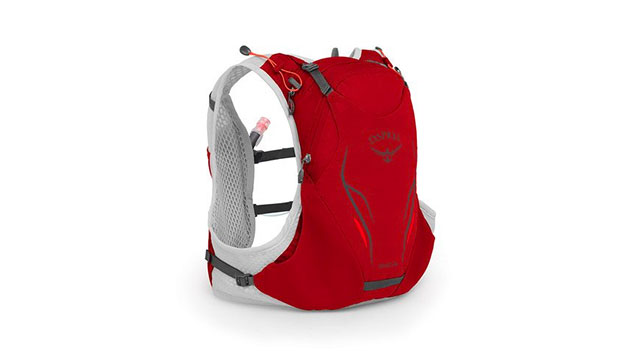
SPECS
- Material: Nylon triangle ripstop, nylon stretch mesh
- Weight: S/M = 0.68 lbs., M/L = 0.71 lbs.
- Dimensions: S/M = 14.2"H x 7.9"W x 5.1"D, M/L = 16.1"H x 7.9"W x 5.1"D
- User fit: Men
- Pockets: Vertical harness pocket, dual lower stretch mesh harness pockets, dual extra-large stretch mesh harness pockets, front panel zippered slash pocket, front panel mesh compression pocket.
- Capacity: S/M =5L, M/L =6L
- Hydration capacity: 1.5L
- Special features: Stabilizing compression straps, dual mesh food/supplement harness pockets, trekking pole attachment
- Warranty: Osprey's Almighty Guarantee includes free repairs of any damage or defect
A common problem athletes have when they are picking a backpack for running is finding a bag that has enough storage but is also functional. Enter our pick for the best overall running backpack, the Osprey Duro 6. This backpack strikes a delicate balance between utility and functionality. It has plenty of storage for items you may need on a long-distance run—fuel, extra clothes, pack jacket, or other personal items—while maintaining a comfortable, tight fit.
Many running backpacks try to accomplish this balance, but the Duro 6 stands out from its competitors because of its design. The stabilizing compression straps on the Duro 6 keeps the items in the backpack from moving during your run and makes sure the weight stays evenly distributed. The Duro 6 even has a trekking pole attachment if you're looking to use the pack on a long hike. With the Osprey Almighty Guarantee backing up the product, the Duro 6 is a well-rounded running backpack.
What We Like
- Expandable compression straps provide a versatile fit
- Lightweight material
- Very stable when running
- Good storage capacity for size and weight
- Almighty Guarantee covers all rips, tears, and defects
What We Don't Like
- Hydration pack tube is designed to go over the left shoulder only
- Chest strap pocket is too small for larger cell phones
Best Trail Running Backpack: Camelbak Octane Dart 50 oz.
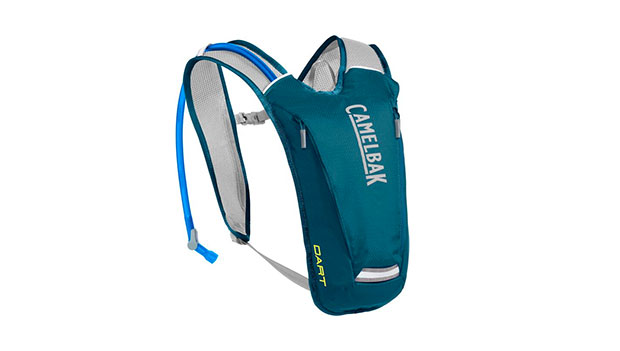
SPECS
- Material: 100% nylon
- Weight: 7 oz.
- Dimensions: 12.4" x 8.7" x 4.9"
- User fit: Unisex
- Pockets: 4 exterior
- Capacity: 0.5L
- Hydration capacity: 1.5L
- Special features: Reflectivity, front-facing harness pockets
- Warranty: Lifetime Warranty
If you're looking for a backpack specifically for trail running, it is important to have a backpack that won't slow you down or throw you off balance with bulky features. For a trail running backpack, we recommend the Camelbak Octane Dart 50 oz. This backpack is a sleek, comfortable design that is made to be forgotten while you're out on your adventure. The materials used to make the Dart are very lightweight and are complemented by minimalist pockets that will be just large enough to hold your essentials.
The 1.5L water reservoir is more than enough for most single-day trail runs, and the Dart features Camelbak's newly designed mouthpiece, the Crux, which makes the hydration apparatus flow at a higher rate. The Dart also features reflective material for easy visibility on runs during the early morning or evening hours. If you're looking for a minimalist running backpack for trail running, the Dart is a great pick.
What We Like
- Lightweight, comfortable material
- Standard size hydration capacity
- Minimalist design
- Reflectivity for easy visibility
What We Don't Like
- Backpack moves when the water reservoir is full
- Small storage capacity
- Water reservoir leaks if the on/off level is not used properly
BUY: Camelbak Octane Dart 50 oz.
Best Running Backpack for Distance Running: Salomon Active Skin 4
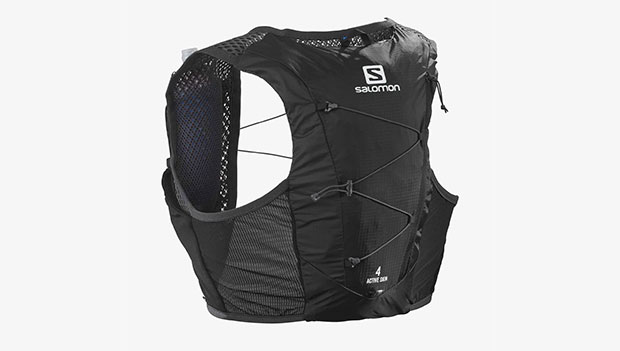
SPECS
- Material: Polyamide, polyester, and elastane
- Weight: 7.1 oz.
- Dimensions: 16.5" x 13.5" x 0.4"
- User fit: Unisex
- Pockets: 5 exterior plus main compartment
- Capacity: 4L
- Hydration capacity: 34oz./1L
- Special features: Includes two 17 oz. soft flasks
- Warranty: 2-year limited warranty
As the name implies, the Salomon Active Skin 4 is a form-fitting, minimalist backpack that sacrifices some storage functionality for a tight, comfortable fit. This backpack features five exterior zipper pockets and one larger main compartment. The Active Skin 4 is designed with lightweight and low-maintenance materials for users who will be covering a lot of ground. Despite a very snug fit, the quick-drying material of the Active Skin 4 keeps the backpack from absorbing extra moisture from sweat or water spills.
Despite its size, the Active Skin has enough storage for essentials. The main compartment is large enough for a 1.5L water reservoir that is easily removable for shorter runs. The Active Skin 4 is not unique for simply being a snug-fitting backpack, but the feature that sets it above the competitors is the elastic chest strap. The elastic strap allows you to adjust the backpack to access all exterior pockets easily without removing the whole backpack or worrying about jostling the weight distribution.
What We Like
- Conforms to the body for a good fit
- Fast-drying material
- Two 17 oz. soft water flasks included
- Elastic chest strap allows for easy adjustment
What We Don't Like
- Water reservoir not included
- No interior pocket for small valuables
Best Running Backpack for Commuting: Lululemon Active Backpack 14L
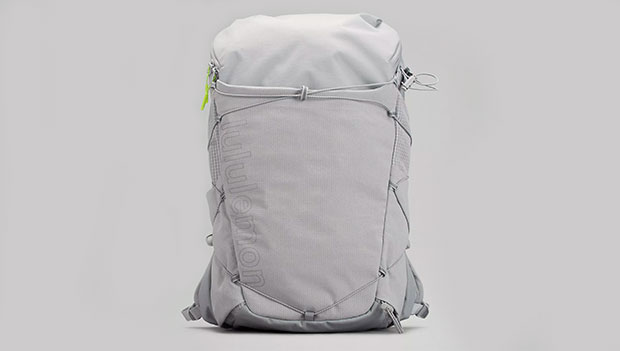
SPECS
- Material: Polyester, thermoplastic polyurethane, nylon
- Weight: N/A
- Dimensions: 17.3" x 9.8" x 5.5"
- User fit: Unisex
- Pockets: Inside and outside zip pockets plus main compartment
- Capacity: 14L
- Hydration capacity: 1.5L (reservoir not included)
- Special features: Water repellent material
- Warranty: Lululemon Standard Warranty
Our pick for the best running backpack for commuting is the Lululemon Active 14L. It includes a large amount of versatile storage, including an interior zipper pocket in the main compartment and a water reservoir sleeve that can fit a 1.5L reservoir. However, the side pockets are large enough for water bottles or shaker bottles up to 1L in size, which will allow you to leave the main compartment open to store all of the materials you may need for your day.
This backpack's material is water repellent and has reflective details which means you'll have a companion through inclement weather and early morning or late night commutes. With bungee cord loops on the side for storing trek poles, the Active 14L can also accompany you on hikes or long trail runs. Lululemon is known as a premium brand, and this running backpack is no exception. If you're looking for a durable commuting backpack with plenty of storage and functionality, the Active 14L is our recommendation.
What We Like
- Water repellent
- Zippered interior pocket
- Bungee loops for trek poles
- Side pockets for water bottles
- Reflective details
What We Don't Like
- Only comes in 1 size
- Not a snug fit
BUY: Lululemon Active Backpack 14L
Best Lightweight Running Backpack: Osprey DYNA 1.5
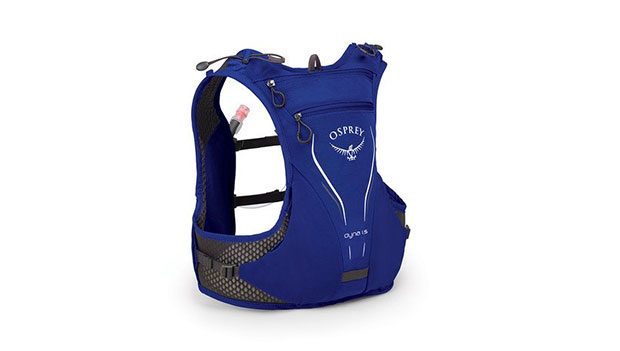
SPECS
- Material: Nylon triangle ripstop
- Weight: 8 oz.
- Dimensions: 13.4" x 8.7" x 2.4"
- User fit: Women
- Pockets: 7 exterior pockets plus internal reservoir sleeve
- Capacity: 1L
- Hydration capacity: 1.5L
- Special features: Trekking pole attachment, women's fit, lower expansion compression straps
- Warranty: Osprey's Almighty Guarantee includes free repairs of any damage or defect
This is the second Osprey backpack to make an appearance on our list, and that's because Osprey has figured out how to maximize functionality with their running backpacks. Most of the backpacks on our list have been a unisex fit, but we also understand that a one-size-fits-all approach may not be the best fit for you. The DYNA is engineered to specifically fit women, with stabilizing and expanding compression straps that will hold your bag in place during any run.
Similar to the best overall running backpack on our list, the DYNA has Osprey's pocket design with an amazing seven exterior pockets. Mesh pockets are easily accessible storage for food and hydration, while the zipper pockets provide secure storage for personal items or recovery items you may need immediately post-run. The DYNA is lightweight, but also includes a compression strap that allows you to add as much weight in the pockets as you can fit without worrying about stress on the back and shoulders.
What We Like
- Women's fit
- Expandable compression straps
- Removable reservoir for increased storage
- Strap pockets
- Lightweight
What We Don't Like
- Only 1 size option
- Strap adjustment placement isn't ideal
Best Budget Running Backpack: Vibrelli Hydration Backpack
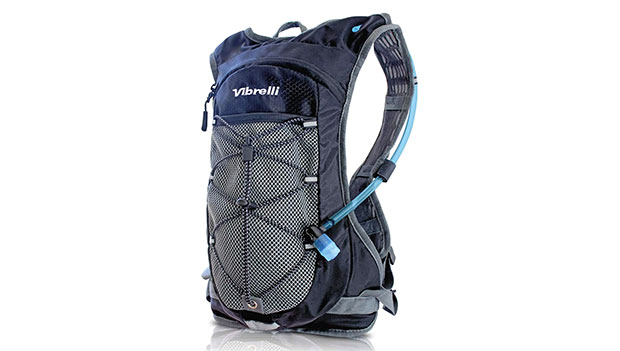
SPECS
- Material: Nylon
- Weight: 14 oz.
- Dimensions: 16" x 12" x 3"
- User fit: Unisex
- Pockets: Quick access mesh pocket plus main compartment
- Capacity: 122"
- Hydration capacity: 2L
- Special features: High-flow bite valve on the hydration pack, ergonomic waist band
- Warranty: 5-year manufacturer warranty
Looking for the best running backpack while on a budget can be a daunting task. The cost of running backpacks varies greatly, and the top-end brands can be a big financial commitment. Whether you're not sure a backpack is worth the money or if you're a beginner who wants to see if a running backpack is the right piece of equipment to help you reach your fitness goals, the Vibrelli Hydration Backpack is our recommendation.
The Vibrelli has a simple design with two storage areas: the main compartment and a front panel mesh pocket. Both of these storage areas are large and not compartmentalized so they can store everything you'll need on a long or short-distance run. The hydration pack is slightly larger than others on this list and can be removed for added storage space. The Vibrelli's easily adjustable chest and waist straps give it good stability for a variety of body shapes.
What We Like
- Low price point
- Bite valve prevents leaking
- 5-year warranty
- Large storage compartment
- Bungee straps for extra storage
What We Don't Like
- No compartmentalized storage
- Heavy base weight
BUY: Vibrelli Hydration Backpack
Best Minimal Running Backpack: FITLY Running Pack
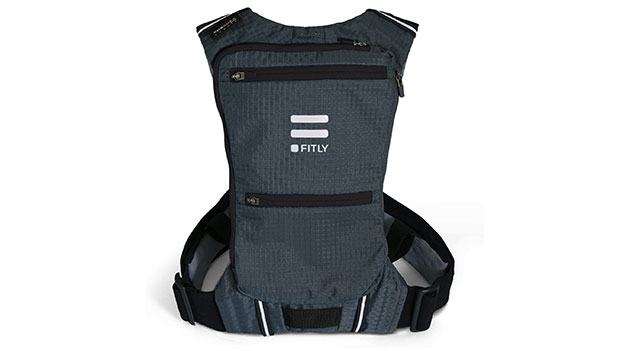
SPECS
- Material: UltraWick Techno-Fabric
- Weight: 7.8 oz.
- Dimensions: 10" x 7" x 0.8"
- User fit: Unisex
- Pockets: 6 pockets plus hydration pack insert
- Capacity: 0.5L
- Hydration capacity: 17 oz.
- Special features: Magnetic fastener, flask Thermopocket, thoracic belt system
- Warranty: Fitly General Warranty
If you are a runner who values utility and functionality over other features, then the FITLY Running Backpack would probably be a great pick for you. FITLY puts all of its creative design energy into functionality features. The Thoracic Belt System is patent-pending and fastens just below the chest line for maximum stabilization. The Thoracic Belt System also has two small pockets on either side of the fastener which FITLY designed to be placed in your natural running range of motion.
The hydration pack on the FITLY is one of the smallest on the list, but it is removable and functions as a soft flask when removed from the pack. The hydration insert is also lined with FITLY's Thermopocket technology that keeps the water from warming up due to exterior or body temperature increases. Finally, the FITLY is made from UltraWick fabric which makes this backpack one of the most water-resistant running backpacks on our list.
What We Like
- Water resistant
- Hydration pack can be used as a soft flask
- Magnetic fastener allows easy adjustments
- Tight, secure fit
What We Don't Like
- Limited storage
- Small hydration capacity
Best Running Backpack for Marathons: Camelbak Zephyr Vest
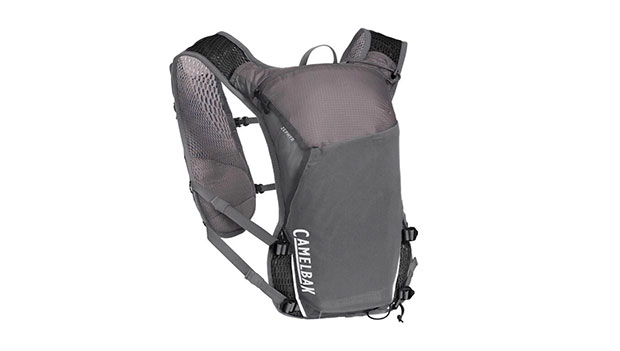
SPECS
- Material: Knitted mesh
- Weight: 7 oz.
- Dimensions: 14.5" x 10.6" x 6"
- User fit: Unisex
- Pockets: Cellphone pocket, main compartment, and stretch overflow pocket
- Capacity: 11L
- Hydration capacity: Two 17-oz. Flasks, optional reservoir (not included)
- Special features: Chest pockets for flasks, treated with Polygiene antimicrobial
- Warranty: Lifetime Warranty
When you're running a marathon, there are a variety of things you need to plan for. Adequate hydration, easy-access fuel, and the ability to shed a layer of clothing and stow it with ease. The Camelbak has made the Zephyr vest to meet all of these needs and more. The most unique part of this running backpack is the hydration system. The Zephyr is compatible with a traditional hydration reservoir and tube system, but the main feature of this backpack is the dual chest strap pockets for access to the 17-ounce soft flasks within the natural running motion.
The breathable mesh material of the Zephyr will keep you cool as you cover long distances over hours of effort, and a large amount of storage will let you stuff and go as you shed layers. Using the flasks instead of a reservoir gives you even more storage space to pack the fuel and gear you need as you prepare for your marathon. Despite all of these features, the Zephyr is made of exceptionally lightweight material that fits snuggly on your back.
What We Like
- Chest strap pocket for hydration flasks
- Lightweight
- Water reservoir compatible
- A lot of storage
- Breathable mesh material
What We Don't Like
- Limited compartmentalized storage
- Included hydration flasks are only 17 oz.
- Potential jostling of items in the large pockets
Best Running Backpack for Nighttime: NathanPinnacle 12L Hydration Vest
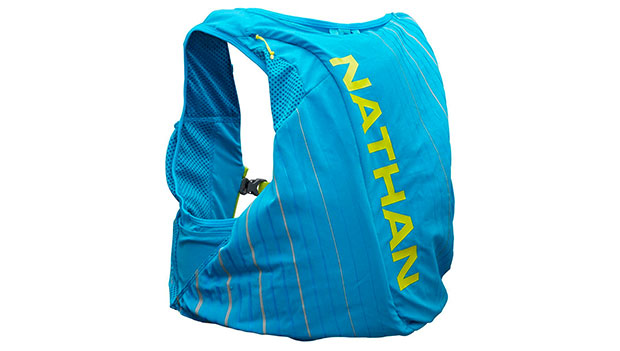
SPECS
- Material: Polyester, nylon, and spandex
- Weight: 11 oz.
- Dimensions: 16" x 16" x 4"
- User fit: Unisex
- Pockets: 2 chest, 2 back, 3 side, and 1 vertical
- Capacity: 12L
- Hydration capacity: 1.6L
- Special features: Reflective details, access storage from top and side
- Warranty: Manufacturer limited lifetime warranty
Nighttime runs present their own unique challenges and thrills. You don't have to be an extreme endurance athlete to enjoy a nighttime run, but you do need to be well prepared. The NathanPinnacle 12L Hydration Vest sports high visibility colors and reflective detailing for a safe nighttime run while giving you ample space to be prepared with any gear you may need for your specific goals.
The Nathan Pinnacle 12L is a heavier running backpack than other options on our list, but the eight pockets accessible from multiple angles is by far the most comprehensive storage system. A unique feature of this backpack is its shape. Where most backpacks have shapes cut to fit the body, the NathanPinnacle is relatively formless which allows it to mold around your body.
What We Like
- Significant compartmentalized storage
- Side access to main storage
- Highly reflective details and coloring
- Large water reservoir
What We Don't Like
- Lack of fit customization
- Heavier than most backpacks
BUY: NathanPinnacle 12L Hydration Vest
Best Running Backpack for Walking: adidas Terrex Aeroready
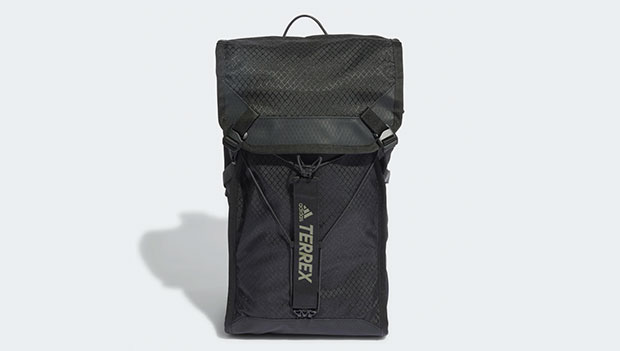
SPECS
- Material: 100% recycled polyester
- Weight: N/A
- Dimensions: 19.6" x 11.4" x 7.87"
- User fit: Unisex
- Pockets: Divided main compartment, 2 side pockets
- Capacity: 35L
- Hydration capacity: N/A
- Special features: AEROREADY moisture-absorbing technology, 13-lb. gear capacity, detachable bungee system
- Warranty: None
The adidas Terrex Aeroready is what you get when you mix the features of a typical running backpack and the storage capacity of a normal backpack. This backpack is made for carrying gear and necessities, and it can carry a lot. The 35L storage capacity is over double the size of anything else on the list, and the material is graded to hold up to 13 pounds in that storage space. It also has the water-repellant benefits of a typical running bag as well as the versatility of an adjustable chest strap, compression straps, and external bungee straps for additional storage.
The Terrex Aeroready does not include a hydration system, but it is compatible with one. It's also large enough to just store your choice of water bottle alongside any other gear you may need. If you choose not to use a hydration bladder, the padded interior pocket is great for a laptop, making it a versatile choice for all your needs, from a hiking adventure or weekend camping trip to your daily commute.
What We Like
- Water repellent material
- 13-lb. gear capacity
- Large storage compartment
- Detachable bungee system
What We Don't Like
- Single access point for storage
- No built-in hydration system
FAQs About Running Backpacks
Is it good to run with a backpack?
The short answer is, that it depends. The longer answer is that it depends on your goals. If you are going for a short jog around the block, then running with a backpack is probably not necessary. Will it hurt you? Not if you use the backpack properly, but its purpose will likely not align with your goal.
On the other hand, if you are looking for a backpack to store gear, essentials, and the hydration you'll need on a distance run, then a running backpack will most likely be a good addition to your equipment. This is the primary purpose of running backpacks, and it extends to hiking, cycling, or any other activity that will require you to be away from hydration for a medium to a long period of time.
How do I choose a running backpack?
There are a lot of factors to consider when choosing the running backpack that is right for you. The primary factor to consider is your intended use for the backpack. If you're going to run a marathon you will need a different backpack than you would need if your intention is to take up medium-distance running for general fitness.
Other factors to consider include storage space, hydration capacity, fit, and price. However, all of these factors are secondary to and directly influenced by your intended use. You won't need to shop for premium running backpacks with a 2L water reservoir if you never intend to run farther than a couple of miles around your neighborhood.
How should a running backpack fit?
Running backpacks should generally have a snug fit with extra stability across your shoulders and chest. There are two main reasons for this. The first is that loose weight on your back can cause your body serious injury under normal circumstances. Add in strenuous exercise, and a loose backpack is a recipe for disaster.
Second, even if your backpack has a snug fit on your back, it needs to have stability straps to distribute the weight across your frame. This will take the pressure off of one muscle group and keep the weight from shifting in a way that can cause your muscles to overcompensate and result in injury.
How to Train for a Half Marathon | Running Tips for Your First Half Marathon | Best Half Marathons | Long-Distance Running Shoes | Running Socks | Running Water Bottles | Running Backpacks | Running Belts | Wireless Earbuds for Running | Garmin Fitness Watches
About the Author

Cory is a certified personal trainer and fitness nutrition coach. After spending six years as an educator and coach, Cory joined the ACTIVE team as a staff writer turning his passion for education toward helping ACTIVE readers live their best, healthiest lives.
Get ACTIVE on the Go


Couch to 5K®
The best way to get new runners off the couch and across the finish line of their first 5K.
Available for iOS | Android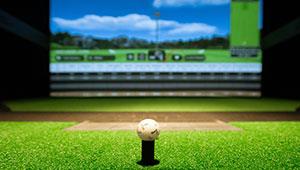

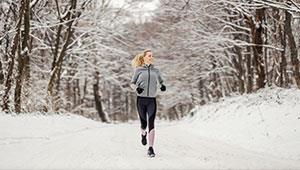

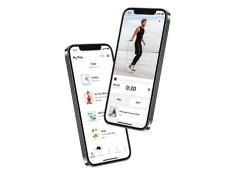
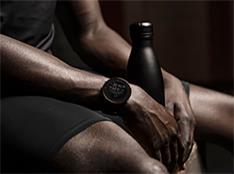

Discuss This Article